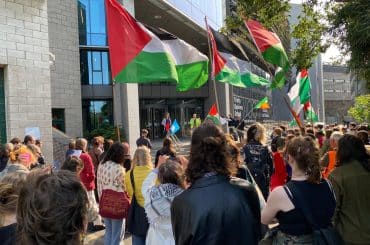 Palestinian children play in a polluted stream contaminated by wastewater from Ariel settlement, Bruqin, West Bank. (Photo: EWASH-OPT)
Palestinian children play in a polluted stream contaminated by wastewater from Ariel settlement, Bruqin, West Bank. (Photo: EWASH-OPT)
“The bad odor is constant here and nowadays it has become normal to find rodents and insects in this area” Ahmed, a resident of Burin, tells staring at the smelly polluted water flowing less than 10 meters from the houses of his village located between Salfit and Nablus, in the northern part of the West Bank – “It’s not only about the smell. In the village a lot of people suffer from skin diseases, asthmas, and other illnesses.” The waste water stemming from Ariel settlement has played a major role in the contamination of water and in the pollution of the environment in the Salfit area. Due to the concentration of pollutant elements in this zone, many agricultural fields have been destroyed and many animals and plants have been killed. Moreover, many infectious waterborne diseases, like diarrhea, have broken out especially among children.

Betar Illit from Nahalin (Photo: Marta Fortunato)
The inhabitants of Wadi Fukin and Nahalin, south-west of Bethlehem, face the same problems. Surrounded by the Israeli settlement of Beitar Illit, these two villages, known for the quality of the agricultural products, are constantly threatened by the flow of waste water coming from the nearby settlement. “Inside Beitar Illit there is a waste water treatment facility but it can’t handle the amount of waste water it receives and as a consequence it overflows reversing untreated waste water onto the agricultural fields” explains Dib Najajrah, a resident of Wadi Fukin. “Moreover, in the last years the settlers have started attacking our crops by deliberately pumping the waste water coming out of the settlement into the cultivated land of Nahalin.”
Water pollution and contamination of ground water are the main environmental threats that the Palestinians living in the West Bank have to deal with. As an occupying power, according to the article 56 of the Fourth Geneva Convention, Israel has the duty of “ensuring and maintaining, with the cooperation of national and local authorities… public health and hygiene in the occupied territory” in order to prevent the spread of diseases and epidemics. However, since 1967 Israel has consistently failed to provide Palestinians with efficient sewage and waste water facilities and at the same time the Israeli settlements have started discharging untreated domestic and industrial sewage onto the aquifer, causing the contamination of ground water and the destruction of Palestinian agricultural fields.
Only in recent years did Israel start equipping the settlements with sewage treatment plants and facilities but the problem hasn’t been solved as settlements still continue to be the major cause of environmental pollution in the West Bank. Half a million Israeli settlers living in the West Bank produce 54 million of cubic meters of domestic waste water per year, an amount which is larger than the one produced by the two millions and a half Palestinians living in the West Bank (Applied Research Institute, 2008). Moreover, according to a report about water pollution published by Israel’s Environmental Protection Ministry, the Nature and Parks Authority and the Civil Administration in August 2008, only 81 out of 121 Israeli settlements in the West Bank are connected to waste water treatment facilities and most of them are small and can’t handle the large amount of waste water produced. As a result, only 12 MCM of settlement waste water out of 17.5 MCM of the West Bank (excluding East Jerusalem) settlements are treated. Moreover, as reported by the Israeli NGO B’tselem in June 2009, none of the Israeli “outposts” were equipped with waste water treatment facilities.
As far as Palestinians in the West Bank are concerned, the situation is not better. Only 31 percent of them are link to sewage network – with only one waste water treatment plant in operation in al-Bireh (Ramallah) – while the remaining two third of the population depends on self-installed cesspits and septic tanks. The main reason for this deficiency is due to the Israeli refusal to grant permits to Palestinians, through the Joint Water Committee (JWC) – established with Oslo in 1995 – and the Israeli Civil Administration. Between 1995 and 2011 only 4 waste water treatment plant projects out of 30 were accepted. The Israeli government uses the veto power in the JWC as a “political bargaining chip” (COHRE, 2008). For example, in 1998 the Palestinian Water Authority received funds from the German Development Bank to build a wastewater treatment plant in the Salfit Governorate. The JWC approved the project conditional upon connecting the largest West Bank settlement of Ariel to the treatment plant.
“This isn’t the full story” Dib continues – “Not only does Israel fail to provide facilities to Palestinians, but it also profits from the Palestinian untreated waste water.” Indeed Israel exploits the untreated Palestinian waste water, by treating it inside modern facilities located in Israel and reusing it to irrigate agricultural fields in Israel, deducting the cost for treating the wastewater from the tax monies of the Palestinian Authority.



A perfect symbol of Israel and the settlers attitude. We sh*t on you. Same as their attitude to American voters and just about everybody outside the bubble.
Correction The waste material is still inhabiting the illegal settlements.
This is in perfect accord with the “Arabs are animals” idea.
Think about how people have treated animals through the ages. If they are considered a nuisance or interfere with what people want to do, they are swept from the area by hunting or poisoning. If not a nuisance, they are ignored and left to deal with the consequences of human populations as best they can. My drinking water and yours must be pure, but the animals can swim in our sewage, so what? After all, they are just animals.
We humans, as we are always pointing out to each other, are not animals, right?
They really have ruined a beautiful countryside.
>> Half a million Israeli settlers living in the West Bank produce [a larger amount of waste water] than the one produced by the two millions and a half Palestinians living in the West Bank …
Makes sense: The Zio-supremacist “Jewish State” colonists are more full of shit than the Palestinians they oppress.